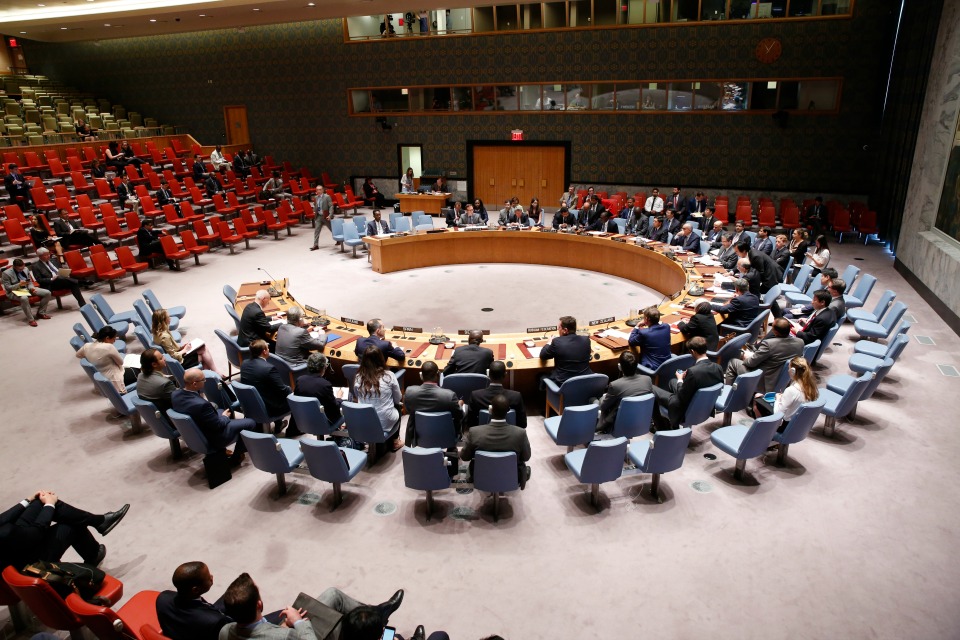"Behind that suffering of the millions of men, women and children in the Lake Chad Basin, lies the brutality and unrelenting cruelty of Boko Haram."
Statement by Ambassador Peter Wilson, UK Deputy Permanent Representative to the United Nations, on the Lake Chad Basin.

Thank you Mr President - and thank you too to our briefers. I particularly want to pay tribute to Fatima Askira - the bravery that she represents and the inspiration that she gives to many.
The United Kingdom is taking the floor in open session this afternoon because we cannot afford to stay silent on this issue, as Samantha has so clearly and articulately set out. We’ve just heard the humanitarian situation in the Lake Chad Basin is simply horrifying.
Over 11 million people are in need of humanitarian assistance. Over 2 million are displaced in north eastern Nigeria alone, with hundreds of thousands more in Niger, Cameroon and Chad. And it’s only going to get worse. In a matter of months, supplies from the poor harvest will begin to run out, further compounding a disastrous situation.
Behind that suffering of the millions of men, women and children in the Lake Chad Basin, lies the brutality and unrelenting cruelty of Boko Haram. They are a clear threat to international peace and security and we have a clear responsibility to take action in response.
That action will require a sustained, multi-year, international effort to address the overwhelming humanitarian need as well as the drivers of conflict that have helped Boko Haram flourish in the first place.
So we need to up our game. I call on donors, governments in the region and international NGOs urgently to scale-up efforts. Collectively our response so far has, frankly speaking, been inadequate and underfunded. The United Nations has called for a billion US dollars for Nigeria and 310 million for Cameroon. The United Kingdom will do its bit. We announced an additional 97 million US dollars of humanitarian aid for the region in September, adding to our existing multi-year commitment of 110 million. I hope others will join us.
But money alone is not enough. We also need to see strong, effective leadership, both from governments in the region and from the United Nations. We look to the UN to increase its capacity in the Lake Chad Basin and develop multi-year plans that are coordinated across borders to aid recovery.
We, in this room, also need to show leadership ourselves. A Security Council visit to the region in the coming weeks would be a signal of that leadership, and a chance for all of us to see firsthand the challenges that that region faces.
One such challenge is the concerning report of forced and incentivised returns of displaced people to areas that remain unsafe. When you’ve fled murder or enslavement, it is simply unthinkable to be forced back to the scene of that horror; unthinkable to be lied to or coerced into returning.
All parties to the conflict have a responsibility to respect international conventions on returns and the protection of civilians more broadly. I urge them to do so.
Ultimately, Mr President, a humanitarian response is just one part of the solution. It is a vital part, of course, but it needs to be delivered, hand in hand, with a coherent security, political and economic response too. There is little sense in healing the wounds of conflict without addressing the root causes too.
So let us call on all governments in the region to win the peace, to tackle under-development and other conflict drivers, and to do so in a way that respects international humanitarian and human rights laws. That means doing so for all people in the region, making sure that women have an equal say and an equal role in reaching that peace. It’s vital that strategies to tackle Boko Haram include women’s voices. This includes all efforts to free the remaining Chibok girls and when providing protection for women affected by sexual and gender based violence.
Mr President,
I’d like to close by returning to Maiduguri in north eastern Nigeria. We raised the plights of displaced people in that city six months ago when we last discussed this issue. Six months on, the situation remains desperate. Over a million displaced people now call Maiduguri home. The cost of food has doubled in the past year. Disease and hunger are all too common.
But there are signs of hope. In the past three months, Medicins Sans Frontieres have delivered 810 tonnes of food to Maiduguri. As the MSF head of mission there made clear, it’s not normally the role of a medical charity to provide people with food. But faced with the desperate need, MSF stepped up to help. That is the spirit that we all need to channel in the weeks and months ahead if we are to end the catastrophe in the Lake Chad Basin.
Thank you.